| Listing 1 - 10 of 20 | << page >> |
Sort by
|
Book
ISSN: 03550192 ISBN: 9519040196 9789519040196 Year: 2004 Volume: 63 Publisher: Helsinki : Société néophilologique,
Abstract | Keywords | Export | Availability | Bookmark
 Loading...
Loading...Choose an application
- Reference Manager
- EndNote
- RefWorks (Direct export to RefWorks)
Language and languages --- Historical linguistics. --- Etymology. --- Koivulehto, Jorma, --- Language and languages - Etymology. --- Koivulehto, Jorma, - 1934 --- -Language and languages - Etymology. --- -Philologie --- -Historical linguistics. --- Philologie
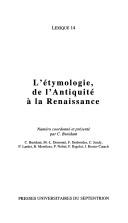
ISBN: 2907170074 9782907170079 Year: 1998 Volume: 14 Publisher: Villeneuve d'Ascq Presses universitaires du Septentrion
Abstract | Keywords | Export | Availability | Bookmark
 Loading...
Loading...Choose an application
- Reference Manager
- EndNote
- RefWorks (Direct export to RefWorks)
Etymology --- Historical linguistics --- Language and languages --- History. --- History --- Language and languages - Etymology - History
Book
ISBN: 8886655827 9788886655828 Year: 2000 Volume: 110 Publisher: Roma CLV - Ed. Liturgiche
Abstract | Keywords | Export | Availability | Bookmark
 Loading...
Loading...Choose an application
- Reference Manager
- EndNote
- RefWorks (Direct export to RefWorks)
Book
ISBN: 8888039422 9788888039428 Year: 2002 Volume: 5 Publisher: Roma : Il Calamo,
Abstract | Keywords | Export | Availability | Bookmark
 Loading...
Loading...Choose an application
- Reference Manager
- EndNote
- RefWorks (Direct export to RefWorks)
Language and languages --- Linguistics --- Etymology. --- Terminology. --- Terminology --- Etymology --- Grammar, Comparative and general --- Word history --- Historical lexicology --- Derivation --- Language and languages - Etymology. --- Linguistics - Terminology
Book
ISBN: 9780199691616 9780199236510 0199236518 0199691614 0191570451 0191618780 Year: 2009 Publisher: Oxford Oxford University Press
Abstract | Keywords | Export | Availability | Bookmark
 Loading...
Loading...Choose an application
- Reference Manager
- EndNote
- RefWorks (Direct export to RefWorks)
This practical introduction to word history investigates every aspect of where words come from and how they change. Philip Durkin, chief etymologist of the Oxford English Dictionary, shows how different types of evidence can shed light on the myriad ways in which words change in form and meaning. He considers how such changes can be part of wider linguistic processes, or be influenced by a complex mixture of social and cultural factors. He illustrates every point with a wide range of fascinating examples. Dr Durkin investigates folk etymology and other changes which words undergo in everyday use. He shows how language families are established, how words in different languages can have a common ancester, and the ways in which the latter can be distinguished from words introduced through language contact. He examines the etymologies of the names of people and places. His focus is on English but he draws many examples from languages such as French, German, and Latin which cast light on the pre-histories of English words.
English language --- Language and languages --- Etymology --- Etymology. --- Anglais (Langue) --- Langage et langues --- Etymologie --- English language - Etymology --- Language and languages - Etymology --- Anglais (langue) --- Étymologie --- Langues
Book
ISSN: 03446778 ISBN: 3484311754 3110917785 9783484311756 Year: 1996 Volume: 175 Publisher: Tübingen Niemeyer
Abstract | Keywords | Export | Availability | Bookmark
 Loading...
Loading...Choose an application
- Reference Manager
- EndNote
- RefWorks (Direct export to RefWorks)
Die Monographie bietet eine umfassende Darstellung des Gegenstands Volksetymologie. Die Arbeit hat drei Hauptteile: Zuerst wird eine forschungsgeschichtliche Darstellung gegeben. Zweitens beschreibt die Arbeit auf der Grundlage von Beispielen die theoretischen Aspekte der Volksetymologie. Drittens ist eine ausgreifende Bibliographie der Forschungsliteratur zusammengestellt. Volksetymologie wurde und wird manchmal als 'Schmunzelecke' der Sprachwissenschaft angesehen. Volksetymologien sind Fehler, und Fehler sind lustig, besonders dann, wenn man sie nicht selbst macht. Volksetymologie basiert auf dem Verknüpfen von sprachlichem Material, das sprachgeschichtlich nicht zusammengehört. Die Beschäftigung mit Volksetymologien zeigt, daß und wie Sprecher (gedankliche) Realität schaffen, um ihren Sprachschatz 'in Ordnung' zu halten.
Etymology. --- Bibliography. --- -Foreign languages --- -Bibliography --- -Etymology --- Language and languages --- -Language and languages --- Languages --- Etymology --- German language --- Anthropology --- Communication --- Ethnology --- Information theory --- Meaning (Psychology) --- Philology --- Linguistics --- Foreign languages --- Grammar, Comparative and general --- Word history --- Historical lexicology --- Derivation --- Language and languages - Etymology. --- Language and languages - Etymology - Bibliography. --- ALLEMAND (LANGUE) --- ETYMOLOGIE
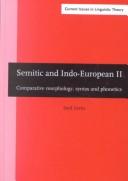
ISBN: 1283312700 9786613312709 9027276471 9789027276476 9027236321 1556195834 9789027236326 9781556195839 1556195834 9781283312707 6613312703 902724734X 9786613312181 1283312182 9027275424 1588112225 1588113337 9789027275424 9789027247346 9027247439 Year: 1995 Volume: 129, 226 Publisher: Amsterdam John Benjamins Pub. Co.
Abstract | Keywords | Export | Availability | Bookmark
 Loading...
Loading...Choose an application
- Reference Manager
- EndNote
- RefWorks (Direct export to RefWorks)
This is a sequel to the author's Semitic and Indo-European: The Principal Etymologies (1995). That volume provided the key examples of morphological correspondences between the Semitic and the Indo-European languages. In this sequel, the author analyzes correspondences of structure, either within a certain group of languages or belonging to a distantly related group, by looking at inflectional morphology, case, grammar, and phonology. Thus are uncovered the prehistoric means of oral communication, linking the forerunners of ancient societies in Asia, Africa, and Europe, as they talked a
Language and languages --- Etymology --- Grammar, Comparative and general --- Word history --- Historical lexicology --- Etymology. --- Derivation --- Language and languages - Etymology --- Langage et langues --- Morphologie (Linguistique) --- Syntaxe --- Phonologie --- Morphology --- Syntax --- Phonology. --- Etymologie --- Historical linguistics. --- Human evolution. --- Language acquisition. --- Language and languages -- Etymology. --- Languages & Literatures --- Philology & Linguistics
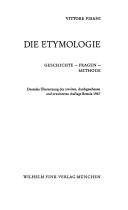
ISBN: 3770511409 9783770511402 Year: 1975 Volume: 26 26 Publisher: München Fink
Abstract | Keywords | Export | Availability | Bookmark
 Loading...
Loading...Choose an application
- Reference Manager
- EndNote
- RefWorks (Direct export to RefWorks)
Etymology --- Language and languages --- -Foreign languages --- Languages --- Anthropology --- Communication --- Ethnology --- Information theory --- Meaning (Psychology) --- Philology --- Linguistics --- Etymology. --- -Etymology --- Grammar, Comparative and general --- Word history --- Historical lexicology --- Derivation --- Language and languages - Etymology
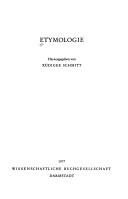
ISBN: 3534069463 9783534069460 Year: 1977 Volume: 373 Publisher: Darmstadt Wissenschaftliche Buchgesellschaft
Abstract | Keywords | Export | Availability | Bookmark
 Loading...
Loading...Choose an application
- Reference Manager
- EndNote
- RefWorks (Direct export to RefWorks)
Etymology --- Language and languages --- Langage et langues --- Etymologie --- -Foreign languages --- Languages --- Anthropology --- Communication --- Ethnology --- Information theory --- Meaning (Psychology) --- Philology --- Linguistics --- Etymology. --- -Etymology --- Grammar, Comparative and general --- Word history --- Historical lexicology --- Derivation --- Language and languages - Etymology
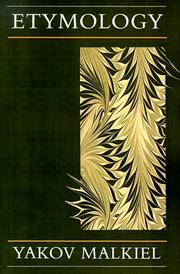
ISBN: 0521311667 052132338X 0511611773 9780521311663 9780511611773 9780521323383 Year: 1993 Publisher: Cambridge : Cambridge University Press,
Abstract | Keywords | Export | Availability | Bookmark
 Loading...
Loading...Choose an application
- Reference Manager
- EndNote
- RefWorks (Direct export to RefWorks)
Etymology has been largely neglected since the beginning of this century. Professor Yakov Malkiel here sets out to rescue it from its fate. He enquires into the style, structure, presuppositions, and purposes of etymological enquiries over the last two centuries, and sets them against the practice of etymology in Antiquity and the Middle Ages. He also examines the complex and changing interrelationship between etymology and general linguistics in recent times, with the intention of revitalising etymological research. Professor Malkiel is undoubtedly one of the most distinguished practitioners of the discipline, and brings to this work a remarkable breadth and depth of scholarship. Wide-ranging and imaginative, Etymology will be welcomed by all historical linguists and Romance linguists.
Etymology --- Language and languages --- History. --- Étymologie --- --Histoire --- --Etymology --- History --- Arts and Humanities --- Language & Linguistics --- Language and languages - Etymology - History --- Histoire --- Foreign languages --- Languages --- Anthropology --- Communication --- Ethnology --- Information theory --- Meaning (Psychology) --- Philology --- Linguistics
| Listing 1 - 10 of 20 | << page >> |
Sort by
|

 Search
Search Feedback
Feedback About UniCat
About UniCat  Help
Help News
News